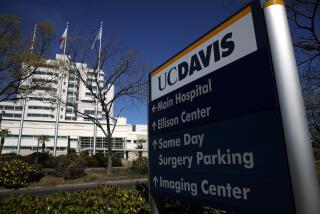Amid measles fears, more than 200 students and staff at L.A. universities are quarantined
Trying to stop a measles outbreak from spreading, health officials announced Thursday that more than 200 students and staff members at UCLA and Cal State L.A. who have been exposed to measles are being asked to stay home.
The five people diagnosed with measles so far in L.A. County this year include a UCLA student and a Cal State L.A. student. Concerned about the quick spread of disease on busy college campuses, health officials have ordered that students and staff exposed to measles who cannot show they have been vaccinated be quarantined until further notice.
The announcement comes on the same day California health officials said 38 people had been infected with measles so far this year in the state, an increase of 15 from the previous week. Measles has been spiking nationwide this year, with 695 cases in 22 states reported so far, the most in the U.S. since 2000.
While the largest outbreak in California is in Butte County in the northern part of the state, health officials also declared outbreaks in Los Angeles and in Sacramento County this week.
County health workers reached out to more than 500 people who may have come into contact with the UCLA student in early April. As of Thursday afternoon, 79 of those students and faculty members had not provided medical records showing that they are immune to measles, according to a statement from the university.
Measles is one of the most contagious viruses in the world, spread by coughing and sneezing. Even after a sick person leaves a room, the virus can linger in the air for as long as two hours, able to infect an unsuspecting victim.
“One person with a confirmed measles case can expose thousands of people to measles,” L.A. County public health department director Dr. Barbara Ferrer said at a news conference Thursday.
At Cal State L.A., 156 library employees — both students and staff — who may have been around the infected student earlier this month, also could not provide their immunization records, according to a statement from the university.
L.A. County public health officials ordered Thursday that anyone who could not provide their immunization records stay at home. As of 5 p.m. Thursday, 235 people were still facing quarantine orders, according to county health officials.
Officials said they would lift the quarantine orders as soon as people showed documentation that they had been immunized or had a lab test to verify their immunity. Without that proof, people exposed at UCLA could be quarantined until April 30 and those at Cal State L.A. until May 2.
“I know there is concern about measles, particularly among the very small percentage of our community who have not been vaccinated,” said UCLA Chancellor Gene Block in the statement. “Please be assured that we have the resources we need for prevention and treatment, and that we are working very closely with local public health officials.”
Cal State L.A. officials said they told those exposed to stay at home. But UCLA officials did not respond to questions about how they would handle quarantined students who live in dorms, often in close quarters. In a statement, they said they had arranged for such students “to be cared for at UCLA while they are quarantined.”
In 2015, the UC system approved a regulation requiring that students be fully vaccinated before enrolling at any campus. At California universities in the last decade, there have been outbreaks of mumps, meningitis and norovirus.
But amid pushback, UC officials did not begin enforcing the regulation until fall 2018, the beginning of the current school year. Therefore, most students at UCLA enrolled before the requirement took effect.
Since the beginning of the year, the nation has been struggling with measles outbreaks across the country, the biggest of which are in New York and Washington states. Most outbreaks begin when an American traveler visits another country, catches measles and brings it back to a neighborhood with low vaccination rates.
High vaccination rates in California seem to have prevented small outbreaks from mushrooming the way they have elsewhere, experts say. California’s largest outbreak, in Butte County, has spread to 16 people. By contrast, an outbreak in New York City has infected more than 320.
California’s high levels of vaccination are partly due to one of the strictest immunization laws in the country, which was implemented in 2016.
But California high school students and young adults who had already finished their schooling when the law took effect were not required to comply. That has left a large pool of young people — many of whom are college-aged now — especially vulnerable to infections, experts say.
This group in their early 20s is part of what’s known as the “Wakefield generation,” because they were infants in 1998 when British scientist Andrew Wakefield published a now discredited paper claiming that vaccines cause autism. Scared of the side effects of vaccination, many parents chose to opt out.
Of the 38 people who have been diagnosed with measles in California this year, three-quarters were 18 or older, said Dr. Gil Chavez, deputy director for the state health department’s infectious diseases center, in a press call with reporters Thursday.
Chavez recommended the measles vaccination, especially for people traveling out of the country. Three-quarters of the measles patients in California were not vaccinated at all or only had one of the two recommended doses of the measles vaccine, said Chavez. Some people fell sick despite being vaccinated because the shot is estimated to be 97% effective, he said.
“That means that even in the best of cases, 3% of people who are immunized are not fully protected,” Chavez said.
The measles vaccine is still considered highly effective and officials recommend it to anyone who has not been immunized yet. People who contract measles after getting the shot tend to have a less severe form of the illness and are less likely to transmit it to others. The measles vaccine is believed to work for a lifetime.
Measles patients in California ranged in age from 5 months to 55 years, Smith said. Some have been hospitalized, she said.
Though measles is most deadly for babies under a year old, children younger than 5 and adults older than 20 are more likely to suffer from other serious complications, such as pneumonia, brain swelling and ear infections that can lead to permanent hearing loss.
“Contrary to what some people think, measles is not a benign childhood disease,” Smith said.
soumya.karlamangla@latimes.com
Twitter: @skarlamangla
More to Read
Start your day right
Sign up for Essential California for news, features and recommendations from the L.A. Times and beyond in your inbox six days a week.
You may occasionally receive promotional content from the Los Angeles Times.







